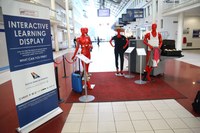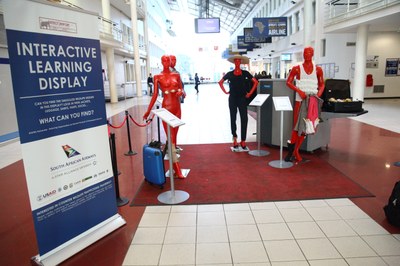New Installation Raises Awareness of Wildlife Trafficking at Johannesburg Airport
Aug 07, 2017
The USAID Reducing Opportunities for Unlawful Transport of Endangered Species (ROUTES) Partnership worked with South African Airways to unveil a life-size wildlife trafficking awareness installation at the staff lounge in Johannesburg’s O.R. Tambo International Airport. The new installation features staged mannequins, customized posters, and informational materials that spotlight wildlife trafficking and provide guidance on how staff can help identify and stop wildlife traffickers from abusing the air transport sector.
The awareness materials – developed and installed under the ROUTES Partnership by Freeland with support from TRAFFIC and the International Air Transport Association (IATA) – reinforce lessons and data from a wildlife trafficking prevention training provided to South African Airways staff and conducted by ROUTES last September.
“A lack of awareness is one of the biggest hurdles in the fight against wildlife trafficking in the air transport sector,” says Matt Pritchett, Director of Trafficking Free Enterprises at Freeland. “This installation brings attention to wildlife trafficking in South Africa’s airports and provides staff with the necessary information to identify wildlife traffickers and safely intervene.”
According to a recent ROUTES report, Flying Under the Radar: Wildlife Trafficking in the Air Transport Sector, South Africa serves as a hotspot for poachers and traffickers supplying wildlife and wildlife products to Asia. Rhino horn, in particular, is commonly smuggled through O.R. Tambo International Airport in Johannesburg. South Africa hosts the largest population of rhinos in the world, but estimates suggest that every eight hours a rhino is killed in the country for its horn, precipitating a species conservation crisis.
South African native, Kayleigh Ghiot, served as the lead designer for the awareness resources and traveled in for the installation’s opening from her residence in Bangkok. “South Africans have always had a special connection to our land and wildlife. If we don’t take action now, we could lose some of our country’s most iconic species before we even realize it’s too late” says Ghiot. “I’m incredibly proud to be back in my home country to illustrate how South African transport industries can implement influential and low-cost solutions that improve safety and security and sustain wildlife for future generations.”
###
FOR MORE INFORMATION:
Flying Under the Radar: Wildlife Trafficking in the Air Transport Sector Report: http://routespartnership.org/press-room/wildlife-traffickers-exploiting-airlines-worldwide
About ROUTES
The USAID Reducing Opportunities for Unlawful Transport of Endangered Species (ROUTES) Partnership brings together government agencies, transportation and logistics industry companies and representatives, international conservation, development and law enforcement organizations and donors in order to disrupt wildlife trafficking activities, and forms a key element of the concerted international response to addressing wildlife poaching and associated criminal activities worldwide.
At the heart of ROUTES is a core group of partners collaborating with the U.S. Government and the transport sector that includes the Center for Advanced Defense Studies (C4ADS), Freeland, the International Air Transport Association (IATA), TRAFFIC and WWF. The Partnership is funded by USAID and coordinated by TRAFFIC. To learn more, visit routespartnership.org or follow @ROUTESPartners
About USAID
USAID's mission: USAID partners to end extreme poverty and promote resilient, democratic societies while advancing security and prosperity. For more information, visit usaid.gov or follow @USAIDEnviro
About Freeland
Freeland is a frontline counter-trafficking organization working for a world that is free of wildlife trafficking and human slavery. Our team of law enforcement, development, and communications specialists work alongside partners in Asia, Africa and the Americas to protect the environment and vulnerable people from organized crime and corruption. For more information, visit www.freeland.org or follow @FREELANDpeople


